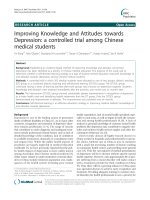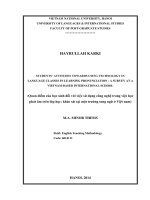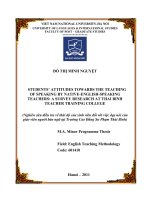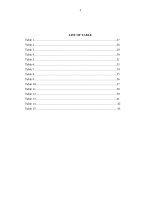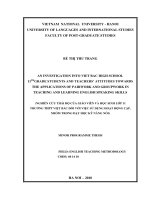IBD Intake 13 Intake 14Spring students’ attitudes towards future career choice
Bạn đang xem bản rút gọn của tài liệu. Xem và tải ngay bản đầy đủ của tài liệu tại đây (551.38 KB, 24 trang )
NATIONAL ECONOMIC UNIVERSITY
INTERNATIONAL SCHOOL OF MANAGEMENT & ECONOMICS IBD@NEU
Topic research:
IBD Intake 13 & Intake 14-Spring
students’ attitudes towards future
career choice
Group 3: Phan Thi Thu Thuy
Pham Ngoc Anh
Nguyen Duc Manh
Tran Minh Hanh
Class:
I14S1
Instructor:Mrs.Le Thi Thu Mai
HANOI, September 2018
1
Acknowledgements
First of all, we would like to thank Mrs. Le Thi Thu Mai for giving us a chance to do this project
on the topic: “IBD Intake 13 & Intake 14-Spring student’s attitudes towards career choices”
with valuable instructions and co-operation during the course.
Finally, we once again would like to say thanks to all the people who had supported us and spent
time to did our survey. This is the first time we have done a project, mistakes are unavoidable .
We would be pleasant to listen all suggestions in order to make this project better.
2
Contents
Table of figures
3
Chapter I: Introduction
I.
Background
Currently, many Vietnamese students do not identify about their future career. They do not
decide whether they should pursue a passion or listen to their parents. Eventually, many students
think that college is the best choice for their career. This is a complicated issue for many
Vietnamese students. The students who study in International Bachelor Degree (IBD) Intake 13
and Intake 14 Spring at NEU are no exception. This program is known as a high-quality learning
program which cooperated with US universities with two degrees of study leading the way in job
choices: business administration and banking and finance sector. However, it has many IBD
students who do not yet identify themselves as well as their future career choice. Even though
they study in that field, it is not the real desire of the students. Some of them just do that because
they don’t know what they actually would like and need. As a result, they decide to follow the
advice of those around them or simply they are forced by their family.
These reasons mentioned above are the motivation for us to do a deep study for the research
“IBD’s students Intake 13 & Intake 14 Spring attitudes towards future career choices”. This
research will help all the students, including those who already have a future orientation may
once again consider their choices and plans. Furthermore, doing this research is extremely
helpful for the author’s research and presentation skills.
II. Rationale/Purpose
A lot of students have not yet set their own paths after graduation. They do not
understand the passion and the work which are appropriate. Therefore, future orientation and
work for new graduates are necessary.
In search, we would like to find out:
The reasons why some IBD’s students Intake 13 & Intake 14 Spring could not
determine, care about future career options or chose career what they would like.
Be aware of the importance of identifying future work goals.
Opportunities & challenges of having identified future and undetermined occupations.
Offering suggestions for IBD’s students Intake 13 & Intake 14 Spring about choosing
a career.
III. Research methods
The analysis of this research is mainly based on:
The primary data which is gained by a practical survey on 70 IBD’s students Intake 13
and 30 IBD’ students Intake 14 Spring.
4
The secondary data which gained from books, newspaper, official documents…
After collecting those data:
Survey questionnaires were delivered to 88 intake 13 & intake 14-Spring students who
had done this survey. A total of 67 students had accepted complete and return the
questionnaires.
Collecting surveys, statistics, analyze from the interview, online sources, official
documents.
Finding specific and possible solutions.
IV. Research questions
• What is the real situation of choosing career in the future among IBD students Intake
13& Intake 14 Spring?
• What career opportunities and challenges do IBD students think they will have after
graduating from IBD?
• How do IBD students accomplish career goals?
V. Structure
I.
Introduction
1. Background
2. Rationale and purpose
3. Research question
4. Methodology
II.
Major Findings
1. The real situation of choosing future career among IBD students
2. Career opportunities and challenges
3. Suggestions
III.
Conclusions
IV.
References
V.
Appendix
5
Chapter II: MAJOR FINDINGS
I.
The real situation of choosing future career among IBD students
Choosing a career is one of the most important decisions a person has to make in their life.
So, to take a multi-dimensional view of IBD intake 13 & intake 14 – Spring students’ attitudes
towards future career choice, to begin with, the real situations will be stated to show the trend of
choosing a major and the appropriate career options.
1. Majors chosen by IBD students
As to be mentioned, the major is one of the factors that show the trend of IBD students’
career choices. Because most of the students had made a thorough academic choice before they
entered university. This chart below points out the majors 67 students have chosen in IBD.
Figure 1 Majors of IBD students
As can be seen from the pie chart, the majority of students who answered the survey
questionnaires chose to study Business administration accounting for 64.2% (43 students) while
and 35.8% (24 students) selected the major of Banking & finance. Research shows that most
students choose Business adminstration more than Banking finance. What led to such a big
difference?
To explain this case, one of the most reasons is that Business administration is related to
many areas such as finance, marketing, human resource management, etc. Thus, it gives students
a great advantage of understanding all aspects of the business. Besides, almost all the theories in
this field are basic and highly appilcable. Accordingly, after graduation, young people can work
6
in many fields such as human resources, PR, production management, etc. (Tran Ha. (2015)).
1
On the other hand, although Banking & finance are also highly attractive, most subjects are
relatively difficult. Because, students need to be able to think logically, calculate and memorize
well cause by Banking & finance is always exposed to numbers and calculations. (Yen Nhi.
(2018)) 2Moreover, absolute precision is extemely important. Just a small mistake in numbers
could push students to a series of big problems and other troublers.
Therefore, these are objective reasons for this tendency.
2. Reasons for choosing a major.
Making a career has never been easy, so apart from the objective reasons of society and
academics, subjective reasons are based on individual factors should also be considered. This
chart indicates information when being asked IBD students about the reasons for choosing that
major.
Figure 2 IBD students’ reasons for choosing major
First of all, the majority of students choose their careers due to their interests and
hobbies. The student thought about careers early on in life and those who also waited until a
decision was required, showed significance. This is considered by students a very significant
factor in choosing a career and good news for our society. The rate is 59.7% in questions.
1 />2 />
7
Secondly, they would like to inherit and maintain the traditional work of the family. This is also
the awareness of young people to continue to develop the work of the family becomes better and
want to devote talent and wisdom to expand the scale to other countries. It occupies 22.4%.
Thirdly, it is unimportant to influence career choices from one person to another for themselves
because at this age they have not been able to make the best choice. So they always need the best
advice to help them better navigate the problem they need to solve. But for those who need
counseling are also very few, they are only about 13.4%. Finally, a small number find a
temporary job to learn the skills and find a suitable job for them to stick with for a long time.
They would like to try themselves in different working environments and where they stop to
make and devote themselves. As far as concerned, they have to be very good people and they do
not would like to be forced into a hard-working environment. They would like to experience and
earn a paycheck that suits with their abilities (accounts for 4.5%).
3. Career guidance
Many career-oriented activities are organized to assist students in choosing their future
careers nowadays. These are supports students in a lot of aspects such as: know the reality of the
labor market, give all students information on all routes, provide work experience, etc.
(Hooley,T. (2017)) 3Participating in career guidance show that students have awareness and
responsibility for the future career.
Figure 3 Percentage of IBD students who get career guidance
3 />
guidance
8
From the pie chart, we can see the number of students have participated in career guidance. It
occupies 59.7% of students who take part in career orientation and 40.3% students who did not
take part in guidance. The number of students who participated in the guidance was 1.48 times
higher than students who did not participate. These percentages show that some of the students
have a sense of responsibility and interest in future careers in finding the right careers and career
traits. Students join in career-oriented activities to find characteristics of the current occupation.
From percentages, it is positive to say that IBD students know and really care about career
guidance.
On the other hand, 27 students (40.3%) never join in any vocational conselling. It shown that
many students do not know it or understand the benefits of participating in this activities.
Therefore, in next chart will indicates some advantages of getting career guidance by 40 students
(59.7%) who getting career guidance.
4. Advantages of career guidance
This chart indicates information when being asked students about benefits of getting career
guidance.
Figure 4 Avantages of career guidance
From the figure, it could be seen that about 34.3% IBD students agree that career
guidance help them increase knowledge, skills which take a highest point of 3 benefits. It
evidence that career orientation helps students a lot in completing themselves like improving
9
their professional knowledge as well as complementary skills to brings success in their chosen
jobs later. Besides, there are 16.4% students who understand more things about professions.
After career-oriented activities, not many students really perceive the profession which they want
to research. Another advantage off career guidance is identifying the strength and weakness of
themselves (23.9%). Therefore, they can innovate and promote their abilities and especially they
will be aware of and orientate which career suits best. 46.3% students in the survey thought that
career-oriented activities give them both of three benefits which are mentioned above.
The fact that career guidance gives students many benefits which support future
career’students a lot. Vocational counseling could reduce the number of changing vocational
choices early in one’s life. Psychologygical testing, one means of helping students focus on an
appropriate career choice, resulted in better employment record, as shown for example in the
stability, promotions earning, and employer ratings thoughout the student’s career. (Supper.
(1957)).4
II.
Opportunities and challenges
Choosing a career is one of the hardest things that people have to do in life. It is not only
pays the bills but one that is also satisfying and above all brings value both to yourself and those
you interact with. This section will show the opportunities and challenges of IBD students who
choose a career.
5. Career opportunities offered to IBD students
In this part, personnel can acknowledge clearly about career opportunities offered to IBD
students.
4
The psychology of careers. New York, NY: Julian Messner.
10
Figure 5 Career opportunities offered to IBD students
Figure 6 Source of information
From the figure 6, it could be seen 6 main jobs chance that students can make a choice
after they graduate from IBD. It shows that IBD students have many opportunities into
experiences and training. According to the research of Thanh Tran said that: "The battle for
human resources" is perhaps never as hot as it is today. Students have a lot of job opportunities
after graduation, and countless channels to find out about employers and get access to "n"
messages from employers. (Thanh Tran. (2016))5. As the figure out, the most popular jobs which
5 />
21062-sinh-vi%C3%AAn-vi%E1%BB%87t-nam-n%C4%83m-2016-th%C3%A0nh-tr%E1%BA%A7n
11
people really is a Marketing executive, which accounts for 40.3% (27 students) of all 5 jobs. It
demonstrates that this job is very competitive and interesting. Nevertheless, there are 13.4% of
students in the survey who choose a recruitment consultant. Perhaps because of this job requires
learning and thinking about the best way to manage your customers and candidates. Besides, the
number of students who would like to Customer service officer (37.3%), Financial Adviser
(37.3%), Learning Experience Officer (34.3%) is most the same. In general, there are stable
office jobs and requirements for these jobs are not too complex. The figure for the shop assistant
is 27%.
Moreover, figure 7 supplies people the source of information which is mentioned above. Most of
the students identified through the subjects that they were studied in IBD (44.8%). Another
source that people can find limitation is Internship which participated by 29.9% students in this
survey. Furthermore, doing consultations seems to be the least popular way to make people know
more about their career chance.
To sum up, figure 6&7 not only shows 6 opportunities of jobs that students can be got but also
furnishes source provided that.
6. Career challenges
Difficulties of choosing a career
While some people are lucky to know what they want to do for the rest of their lives, others
are not so sure caused by a lot of difficulties. There are some reasons that students have to face.
6.1.
Figure 7 Difficulties of choosing a career
12
The most noticeable point is the percent of students’ chose that failed to catch up with
labor market demand. It occupies 43.3% (29 students) of the total number of students who
answered this question. This figure shows that most students worry about labor market demand a
lot. The first and most important cause still comes from the students, the family, and the school
before you enter the University. In Vietnam, the choice of career depends on the parent or career
trends "hot", the opportunity to contact and understand the work in a society with you almost
zero. (Pham Phuong. (2017)). 6Besides, Deputy PM Vu Duc Dam once said: "You can graduate
from university after 4 years, you do not think the knowledge from books, friends, teachers,
work ... can contribute to society. The university offers you basic knowledge but important is the
method and more towards the necessary skills when born.” (Quyen Quyen. (2015))7It could be
said that the college Degree is not at all. Students need to be flexible and develop themselves in
many aspects as required by today’s ever-evolving era. Therefore, this is actually quite difficult
for students.
Furthermore, the percentage of the remaining three issues is not small, accounting for
over 10%. Consent of relative with 28.4% (19 students), suitability with ability and character
occupies 14.9% (10 students), and do not know what i am passionate about accounts for 13.4%
(9 students). A lot of Vietnamese students have to choose their career according to their parents’
expectations or inherit the traditions of their family. However, students do not really love those
jobs. That leads to undesirable consequences as they do not feel disrespectful when choosing
their own careers and do not even know what they would like to be while everything arranged by
their parents.
In conclusion, figure 8 gives a glimpse into the remarkable difficulties of choosing a career.
The most influential people on IBD students’ career choices
Making a career choice is one of the tricky decisions that one has to make in life. As much as
you want to do it right, there is no sure-fire way of doing it. So students usually need support
from many people such as parents, friends, teacher, and even themselve. This graph shows who
is the most influence on career choices’ IBD students.
6.2.
6 />
392183.html
7 />
13
Figure 8 The most influential on IBD students’ career choices
From the figure 8, most students in the survey acknowledged that parents are the biggest
influence on their career choices ( account for 56,70%). It has some reason can explain for this,
for example, young people cannot determine the path that suits them or parents’ educational
background may influence student views on whether or not to continue their education.
Furthermore, 13 students (19.4%) follow their friends’ choice and 14.90% (10 students) believe
in their decisions. Surprisingly, the number of choosing “friends” is quite large because it seems
so adventurous to follow friends who are immature. The other people influence on career choices
of students in survey are teachers. Although they are mature adults with enough knowledge to be
able to inspire students, there are 6 students (9%) choosing them.
Generally, parents could be seen as the most influential people in determining a student's career
but there are still people who support them like teachers ,friends.
The most important goal in career choices
Choosing the right career is always based on the goals that students would like to achieve in
their future careers. This graph will show the important target’s students which are aiming for.
6.3.
14
Figure 9 The most important goal in career choices
As the chart figure 9, people can see opinion of IBD student’s the most important goal in
career choice. It can be seen that 37.2% students make a career choice follow their abilities
which take a highest point of 5 important goals. Taking a job suite for their abilities will make
you feel more comfortable and self- confident in their jobs. On the other hand, degree of selfsufficency (account for 3%) seems to be least important aim in job choice. Besides, Family
foundation and favorite level for work had the same percentage about 20.90%. In Vietnamese
society nowadays, family backgrounds greatly contribute to the advancement of their work.
Along with that, favorite level for the job will determine and persistence you have for the job.
Pham Manh Ha professor said "Choosing the right job is a way for children to enjoy working 8
hours a day, to feel valued when they feel the joy of contributing to society”. (Hoang Phuong.
(2015)) 8Finally, the percentage of salary constant decrease 3% in comparison with 2 types of
goal which are mentioned above. It can be said that salaries are the decisive factor for people to
accept work or not.
Overall, everybody has a purpose in choosing a career and in which the most important is in
accordance with ability.
III.
Suggestions
Career selection is one of many important choices students will make determining future
plans. This is decision will impact them throughout their life. Besides, career planning
encourages individuals to explore and gather information, which enables them to synthesize, gain
8 : />
15
competencies, make decisions, set goals and take action. Therefore, making a plan or setting
goals is a way to help students. It is not only developing themselves but also find out what is
right for them.
7. IBD students planning
According to Schermerborn, Hunt, and Osborn, “Career planning is a process of
systematically matching career goals and individual capabilities with opportunities for their
fulfillment”. 9So, planning is a highly effective action for choosing the right career. This pie chart
will show the percentages of IBD students who made plans for their career and the rest.
Figure 10 IBD students planning
Almost IBD students answered “yes” when they were asked about future career. It occupies
88.1% (59 students) of the total number of students who answered this question. This figure
shows that IBD students care about their future career. There are several ways of future career of
IBD students but 8 students who answered “no” accounted for 11.9% with the figure being
significantly lower. For reasons why that lead to that percentage, we are not clear. They maybe
think career choice is not important or they want to keep their secrets.
8. Plans for future career
A career plan helps students determine their skills and interests, what career best suits with
talents, and what skills and training which need for their career. In this graph, it would like to
show some plans of IBD students who said that they have plans for future career from figure 10.
9 />
16
Figure 11 Plans for future career
As the graph figures out, the most answered is doing part-time jobs. It occupies 33.90% (20
students), accounts for 1/3 of the 59 students who answered this question. There are 30.5% of
students in the survey who choose training at companies. Training at companies is a good option
to find experience. Students who answered studying more skills are accounted for 22% and the
percentage of taking higher education is 13.60%. By developing a career plan, students can focus
on what you would like to do and how to get there. And when students are ready to develop your
resume, they will have a better understanding of their skills and experiences to discuss with
potential employers. A career plan will provide students with tools and information to help them
explore their career options, build experience, prepare for their future career. From the
percentages, it is positive to say that IBD students want to find more experience by doing parttime jobs and training at companies.
Generally, the plans mentioned above are positive. It helps IBD students to perfect
themselves and identify the right career. Particularly, these plans are also recommendation to
support students who do not have plans for their future.
IV.
Opening question
This section deals with the open-ended question “What would you like to be in your future?”
This reflects the interest that is present in IBD intake 13 & intake 14 – Spring students in the
coming years. The following list consists of some of the careers student respondents gave as their
intended job:
Business management
Marketing
Photographer
17
Web designer
Marketing/ psychology
Advertising agency
Social worker
English teacher
Accountant
Public relations
Graphic design
Something with kid
Human resource
Singer
IT
Teacher
Fashionable
Business/ finance
Model
Take over my dad’s construction company
Something in sales or business
Shipper
Secrectary
Teaching assistant
Market management
Salesman
Economic Masters
Actor
Human resources management
Financial management
Office worker
A chef
Owning a coffee shop a painter Beauty blogger
Steamer
Food vlogger
Dancer
Make up artist
Barber
Of the sixty-seven respondents, there were approximated fourty different professions. The fact
that students listed a large variety of professions lead the researcher to believe that students are
exploring career choices. Where else would the diversity come from? Students have also stated
very specifically the area within some career choices.
18
CONCLUSION
I.
Summary
Of 88 surveys distributed, 67 were returned or roughly 76.14%. This statistic reflects the
IBB@NEU students’ attitude and perception of the future career is positive. We believe that
76.14% that felt the subject important to them and had done some research in the career choice
process returned surveys without giving it a second thought. These students are involved and feel
comfortable relaying their thoughts. Those who are confused with the process, who have not
given the subject any thought, or who do not think career choice important, did not return a
survey. We believe that there are as many intimately involved in career choice as those who up to
this point do not see the importance.
It was with great interest that we approached this study. During the past, we have
researched and explored many aspects of future career choices. Career choice is an ever-evolving
process. Career choice is a process that includes experimentation, trial and error, decisionmaking and eventually judgment. From the real situation of research, participating career
guidance is a good activity for students in general, and IBD Intake 13 & Intake 14 – Spring in
particular. Furthermore, this research shows a general overview of the opportunities that IBD
students could access to and the remarkable difficulties that they have to face. Besides, the plans
of the 59 students not only help students develop many skills but also the solution for those who
have not oriented their future career.
II.
Limmitions
Despite having achieved the project’s purpose, but mistakes is hard to avoid. Especially, It is
the first time we have done this research so there are also many difficulties. Finally, our English
skill is not really perfect so there are some grammar mistakes.
19
REFERENCES
1. Tran Ha. (2015). Học ngành Quản trị kinh doanh ra trường làm gì?. [online] Uef.
edu.vn. Available at: [Accessed 5 Mar. 2015].
2. Yen Nhi. (2018). Những yếu tố “cần và đủ” để theo nghành Tài chính ngân hàng – Ngân
hàng kiến thức Phương Nam – Lan tỏa kiến thức Việt. [online] Ngân hàng kiến thức
Phương
Nam
–
Lan
tỏa
kiến
thức
Việt.
Available
at:
[Accessed 15 May 2018].
3. Super, D. (1957). The psychology of careers. New York, NY: Julian Messner.
4. Hooley,T. (2017). Career guidance at school: how to make it work for your students
[online] the Gusardian. Available at: [Accessed 12
Oct. 2017].
5. Pham Phuong. (2017). Sinh viên ra trường có kiến thức đam mê nhưng thất nghiệp
[online] VietNamNet. Available at: [Accessed 12 Aug. 2017].
6. Hoang Phuong. (2015). Chọn nghề theo đam mê hay mốt thời thượng – VnExpress.
[online] Tin nhanh VnExpress. Available at: [Accessed 19 Mar.
2015].
7. Sinhvien.hoasen.edu.vn. (2014). Định hướng nghề nghiệp | Sinh viên Hoa Sen. [online]
Available at: [Accessed 01 Jun. 2014].
8. Quyen Quyen. (2015). Phó thủ tướng: Các bạn sinh viên đừng già trước tuổi. [online]
ZING.VN. Available at: [Accessed 15 Sep. 2015].
9. Thuy Nguyen. (2016). Cha mẹ xin đừng chọn nghề thay con | Việt Nam Mới. [online]
Việt Nam Mới. Available at: [Accessed 21 Nov. 2016].
10. BrighterMonday Kenya. (2016). Career Choice: The Fundamentals of Choosing Right |
BrighterMonday
Kenya.
[online]
Available
at:
[Accessed 25 Oct. 2016].
11. Taylor, L. (2018). Career Choices Summary Report. [online] California. Available at:
[Accessed 2
Apr.2012].
12. Phoenix,& Zanker, B. (2016). Cứ đi để lối thành đường. Hà Nội: Nhà Xuất Bản Thế
Giới,p.256.
20
13. Thuy Hang. (2018). Nắm bắt xu hướng nghề nghiệp để chọn ngành.[online] Việt Nam
Mới. Available at: [Accessed 12 Aug.2018].
14. Nguyen Chi. (2017). Chọn nghề đam mê hay chọn nghề lương cao? [online] Dân trí.
Available at: [Accessed 24 Apr.2017].
15. Thanh Tran. (2016). KẾT QUẢ KHẢO SÁT 21,062 SINH VIÊN VIỆT NAM NĂM 2016.
[online] Linkedin. Available at: />%E1%BA%A3-kh%E1%BA%A3o-s%C3%A1t-21062-sinh-vi%C3%AAn-vi%E1%BB
%87t-nam-n%C4%83m-2016-th%C3%A0nh-tr%E1%BA%A7n
[Accessed
12
May.2016].
21
APPENDIX
I.
Survey Questionnaire
IBD Intake 13 & Intake 14 Spring students’ attitudes
towards future career choices
I.
II.
III.
The real situation of choosing future career among IBD students
Career opportunities and challenges
Suggestions
Hi everyone, we are Group 3 from class I14S1, IBD@NEU. We are doing a little research
for the project subject, so it will be very nice if you do this survey for us.
To start with, please put a tick beside the opinion(s) which closely show your point of view or
write down your answer(s) in the provided space. If there is a * behind a question, you can
choose multiple answers or else you should only tick one.
1. Which is the major that you are studying/ will study in IBD? *
a. Business administration
b. Banking finance
c. Marketing
d. Other ideas
2. Why do you choose this major? *
a. I like it.
b. I want to inherit and promote the tradition of family.
c. Someone else makes that decision for me.
d. This is just temporary.
e. Other ideas
3. Have you participated in any career guidance workshop? *
a. Yes
b. No
4. What career guidance were you involved in?
(Write down)
5. What are the benefits of career guidance compared to career choice/ study? *
a. Supporting me to increase knowledge, skills.
b. Identifying the strength and weakness of myself to identify the appropriate career.
c. Understanding more things about professions.
d. All ideas
22
6. What are career opportunities offered to students studying in IBD? *
a. Customer Service Officer
b. Marketing Executive
c. Financial Adviser
d. Shop Assistant
e. Recruitment Consultant
f. Learning Experience Officer
g. Other ideas
7. How do you know these? *
a. Subjects
b. Consulation
c. Internship
d. Workshop
e. Other ideas
8. Who has the best influence on your career choice? *
a. Parents
b. Friends
c. Teachers
d. Other ideas
9. What is the most important in your career choices? *
a. Family foundation
b. Your abilities
c. Favorite level for work
d. Degree of self-sufficiency
e. Salary
f. Other ideas
10. What are your difficulties when choosing a career? *
a. Failure to catch up with labor market demand.
b. Suitability with ability and character.
c. Consent of relatives.
d. Other ideas
11. What would you like to be in your future? *
(Write down)
12. Do you have a plan for your career choice in the future? *
a. Yes
b. No
13. What is your plan?
a. Training at companies to take more experiences.
23
b. Taking higher education as Master’s Degree.
c. Studying more skills to support future career.
d. Other ideas
24

